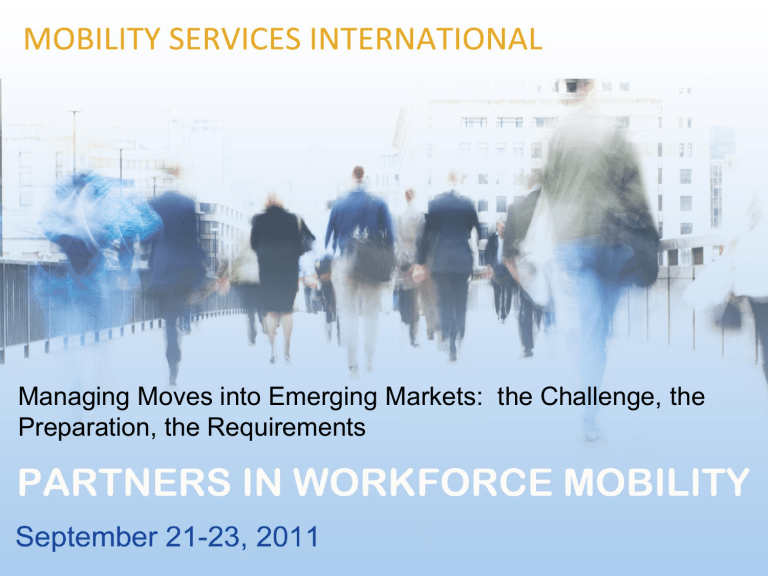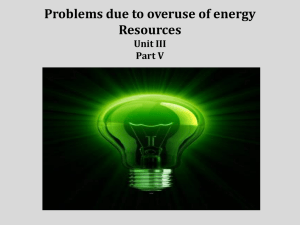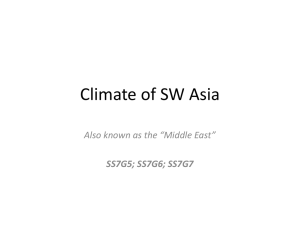powerpoint
advertisement

Managing Moves into Emerging Markets: the Challenge, the Preparation, the Requirements PRESENTERS: Sharon Leong – Regional Director, Global Client Services, Asia Pac, MSI Paul Neve – Regional Director, Global Client Services, Americas, MSI Elaine Phipps – Regional Director, Global Client Services, EMEA, MSI Michael Ray – Vice President, Emigra Worldwide, LLP. Diane Fitz-Gibbon – Director, Global Client Services, MSI (Moderator) Emerging Market Designation What is considered an emerging market? > Nations with social or business activity in the process of rapid growth and industrialization > Currently, there are considered to be 28 emerging markets in the world, with the economies of Brazil, Russia, India, China (BRIC) considered to be the four largest Emerging Markets 2011 - 2012 BRAZIL UAE MALAYSIA PHILIPPINES RUSSIA VIETNAM COLOMBIA UGANDA INDIA POLAND MOROCCO KAZAHKSTAN CHINA PERU CZECH REPUBLIC NIGERIA MEXICO S. AFRICA ETHIOPIA CHILE SAUDI ARABIA THAILAND EGYPT IRAN TURKEY S. KOREA TAIWAN BANGLADESH Data source: MSCI Barra Key Business Drivers for Moves into Emerging Markets According to the Economist, Western multinationals expect to find 70% of their future growth in Emerging Markets - 40% of it in China and India alone! Emerging Market Potential: > Lower operating costs o Free trade zones o Less costly local labor o Tax incentive for foreign investors > Corporate Expansion o New market place o Growth potential > Resources – human, mineral, etc. > Government Joint Ventures – infrastructure, investment Challenges! > On its 2010 Ease of Doing Business Index in a possible 188 countries (1 being the easiest), the World Bank ranked o China 89th o Brazil 129th o India 133rd > Local Market Competition – yes, even in emerging markets! > Immediate access to crucial resources > Potential requirements for new business models to accommodate the needs of the market CONSIDERATIONS Key Destination Considerations > > > > > > > > > > > > > Political Stability & Risk National Security Freedom Rankings Status of Women Unemployment Inflation Rate Safety & Security Compliant Entry Housing & Lifestyle Taxation Health Advisories Risk Management Retaining Talent Key People Considerations > Assessment & Selection for assignment o Ability to overcome barriers to effective operation o Adaptability o Family – accompanied/unaccompanied > Assignment Considerations o Personal safety and security o Risk management o Hardship premium o Home visits, R&R leave o Cultural Training o Language Training o Spousal/family transition counselling o Health o Networks; general support systems Family Transition Counseling Home Visits/R&R Leave Hardship Premium Key Immigration Considerations > Lack of Formal Process o Example: Gabon and Peru- Different each time, timeframe varies > Work is often non-standard o Example: Panama – Canal Work o Example: Sierra Leone - Special Permits > Lack of Transparency in Government Process o Example: Democratic Republic of Congo -“Missing” passports o Example: Laos > Qualified Council not available o Example: Dominican Republic, Indonesia > Unstable Governments or Special Restrictions o Example: Eritrea -Weekly variances o Example: Columbia, China, Italy (strikes) REGIONAL OVERVIEW The Americas Brazil Mexico Colombia Peru Human Development Index (measures quality of life) 73 56 79 63 Political Risk Index 8 6 7 7 Gender-related Development Index (measures status of women) 52 46 55 67 Environmental Issues Scarce fresh, unpolluted water; Deforestation; Air pollution; Widespread soil erosion Taxation Corporate: 15% Personal: progressive, up to 27.5% VAT is 18% Corporate: 28% Personal: progressive, up to 28% VAT is 15% Corporate: 34% Personal: progressive, up to 34% VAT is 16% Corporate: 30 % Personal: progressive at rates of 15%, 21% and 30% VAT is 19% Economic Conditions Strong macro-economic framework; GNP growth: 5.5% Improvement in macroeconomic policies in recent years; GNP growth 4.07%; Very strong economic fundamentals; GNP growth 2.25% Strong economic fundamentals; GNP growth 6.33%; Safety & Security Street crime in major urban areas; Terrorist enclaves; arms trafficking; money laundering Narcotics trafficking and related violence; money laundering Rampant criminal activity related to narcotics trafficking, kidnapping and extortion. High murder rates; weak judicial system High crime: Trafficking and related crimes, theft, armed robbery, and “express kidnappings” Data provided by The World Trade Resource® Deforestation; Loss of biodiversity; Air pollution; Soil nutrient degradation Deforestation; Desertification; Soil erosion; Urban air pollution; River and coastal water pollution; Overfishing Deforestation; Loss of biodiversity; Air & water pollution; Soil nutrient degradation Destination Services – The Americas Brazil Mexico Colombia Peru Availability of short term accommodations Limited; prices increasing Moderate Moderate; limited outside of metropolitan areas Moderate; limited outside of metropolitan areas Availability of acceptable permanent housing Limited; prices increasing Moderate Moderate; limited outside of metropolitan areas Moderate; limited outside of metropolitan areas Good – variety of restaurants and entertainment Good – variety of restaurants and entertainment Good – variety of restaurants and entertainment Moderate – better in cities than rural areas Education facilities Public schools low quality; international & private schools available, but have waiting lists Good – public, private, religious and international schools available Good – public, private and international schools in major metropolitan areas Public schools - good. IB program available in private international schools Medical facilities Good – private healthcare recommended; free healthcare via SUS Good – private healthcare recommended; free healthcare via IMSS Good public healthcare facilities; private coverage recommended for expats Moderate – private healthcare recommended Car and driver recommended; pubic transport moderate in cities Good public transport infrastructure; car & driver not a necessity Car & driver recommended; Poor rural road infrastructure Public transport good in cities; poor in rural areas Quality of life; lifestyle assimilation Transportation The Americas Brazil Colombia Mexico Peru Immigration Solutions – The Americas Brazil Documentation Time Frames Process Red Flags Mexico Document heavy; can take 2-3 months to gather documents Colombia Peru Document heavy; can take 2-3 months to gather documents All documentation must be submitted in Spanish and most foreign documents must be legalized Long government processing times Long overall processing times Long government processing times Many highly specific visa/ permit types; process can vary greatly from case to case Payroll location can affect process Personal appearance is required Several restrictions on payroll and salary requirements Some job categories may require additional documentation and steps, meaning longer processing times The DIGEMIN (Immigration Department) will closely examine the Employer's ratio of foreign to local workers The INM (Immigration Department) will closely examine the Employer's ratio of foreign to local workers Europe, Middle East, Africa (EMEA) Russia The “Stans” Egypt Uganda 65 Afghanistan: 155 Kazakhstan: 66 Kyrgyzstan:109 Tajikistan: 112 Uzbekistan: 102 101 143 7 Afghanistan: 2 Kazakhstan: 6 Kyrgyzstan:5 Tajikistan: 4.5 Uzbekistan: 4 4.5 - 5 6 Not ranked Afghanistan: n/a Kazakhstan: 61 Kyrgyzstan:85 Tajikistan: 93 Uzbekistan: 86 Not ranked 109 Deforestation; soil erosion; air pollution; water pollution; high greenhouse gas emissions Air & water pollution; waterborne disease; overgrazing; soil degradation, erosion; contaminated food sources Loss of agricultural land; soil erosion; desertification; water pollution; waterborne disease Deforestation; overgrazing; soil erosion; draining of wetlands; extensive poaching Human Development Index (measures quality of life) Political Risk Index Gender-related Development Index (measures Status of Women) Environmental Issues Data provided by The World Trade Resource® Europe, Middle East, Africa (EMEA) Russia Taxation Corporate: 24% Personal: 13% (residents), 30% (non-residents) VAT: 18% Data provided by The World Trade Resource® The “Stans” Afghanistan: little tax information Kazakhstan: corporate: 30% Personal: progressive up to 20% VAT: 15% Kyrgyzstan: corporate: 30% Labor taxes up to 27% Tajikistan: corporate: 25% Personal: variable, approx 13% VAT: 20% Uzbekistan: corporate: 12% Personal: progressive, from 13 to 29% VAT: 20% Egypt Corporate: 20% VAT: 10% Uganda Corporate: 30 to 35% Personal: PAYE system of 4 to 20% VAT: 17% Europe, Middle East, Africa (EMEA) Russia The “Stans” Economic Conditions Economy hit hard by global crisis; stabilized in 2010; positive growth outlook for 2011+ Afghanistan: signs of recovery; GNP growth 8.64% Kazakhstan: recovery from sharp declines in 2008 & 2009; GNP growth: 2.4% Kyrgyzstan: unsettled; high inflation; GNP growth: 4.61% Tajikistan: stable; structural reforms; GNP growth 4% Uzbekistan: strong economic growth; GNP growth: 8% Impressive economic performance; resilient economy; high inflation Economic growth; price stability; good fiscal policy; improvement in living standards; reduction in poverty Safety & Security Crime rate high – extortion, kidnapping, narcotics trafficking; money laundering; high growth rate of HIV/AIDS virus Taliban & al-Qaida terrorism threat; Islamic militant organizations; narcotics trafficking; money laundering; street crimes; theft Low rate of crime; money laundering concerns; terrorism threat high; insurgent groups – Islamic Group and Islamic Jihad High rate of crime – theft, armed robbery, assault; Insurgent groups; HIV/AIDS Data provided by The World Trade Resource® Egypt Uganda Destination Services - EMEA Russia The “Stans” Egypt Uganda Availability of short term accommodations Yes major cities; Limited rural Yes major cities; Limited rural Good Yes major cities; Moderate rural Availability of acceptable permanent housing Yes major cities; Limited rural Moderate compounds Good Yes major cities Limited rural Quality of life; lifestyle assimilation Generally good Varied Good Moderate Major cities -International Schools; Rural - local schools only Limited compounds Good Kampala only Varying scale - cities to rural Varied Compounds Good Good Kampala; Limited rural Urban - good Rural - limited Car and Driver required Good Car and Driver required Education facilities Medical facilities Transportation Europe, Middle East, Africa (EMEA) Russia and the ‘Stans’ - Two ends of the scale Middle East/North Africa Sub Saharan Africa – Uganda – Captial vs. Rural Capital Immigration Solutions - EMEA Egypt Documentation All documentation must be submitted in Arabic and must be legalized Russia Kazakhstan Documents may greatly vary on a case by case basis All documentation must be submitted in Russian Time Frames Process Quota program in place (process depends on ratio of foreign to local workers) The employee must be on local payroll with a local contract and is paid in Rubles Red Flags Work permits are granted with the understanding that the foreign national is training a specific Egyptian national “assistant” to fill the same position. If renewal is necessary, it must also be justified why the training is ongoing Companies must submit a forecast of how many foreigners they wish to hire for the coming year, as well as nationalities and job descriptions Uganda Should allow for long processing times Should allow for long processing times Local position must be advertised in country for a period of time Payroll location can affect the process. Can be difficult to find compliant, qualified incountry counsel Considered a “remote location;” processes must be reconfirmed before moving forward on any cases; can have significant variances Asia Pacific China India Vietnam Malaysia Human Development Index (measures quality of life) 89 119 113 57 Political Risk Index 7 8 4.5 8 Gender-related Development Index (measures Status of Women) 64 98 83 50 Environmental Issues Air pollution Forest damage Water shortage Deforestation Soil Erosion Overgrazing Deforestation Soil degradation Water pollution Air Pollution Water Pollution Deforestation Taxation Corporate: 33% Personal: up to 40% VAT: 17% Corporate:40% Personal: progressive up to 30%; VAT 12.5% Corporate: 28% Personal: up to 40%; VAT 10% Corporate: 28% Personal: up to 28% Service Tax: 10% Economic Conditions Fastest growing economy in the world; one of the worlds largest trading countries; GNP growth 11.03% One of the fastest growing economies; sound macroeconomic policies; steady structural reform; GNP growth 8.78% High inflation rate; Industrial sector shown rapid growth; GNP growth 6.04% Transformed from mainly minerals and agricultural exports to manufacturing and services; GNP growth 7.2% Safety & Security Extremely safe, but robbery, mugging, and pick pocketing are becoming increasing common in the urban areas Safe, however there is narcotics trafficking activity; Terrorist violence continues to pose a direct threat Low crime rate; theft is the only major crime, with violent crime rare. Extremely safe, but petty theft is evident and caution should still be exercised at all times. Data provided by The World Trade Resource® Destination Services – Asia Pacific China India Vietnam Malaysia Availability of short term accommodations Sufficient Sufficient Limited Sufficient Availability of acceptable permanent housing Sufficient Sufficient Slight Shortage Sufficient Good Good Moderate Good Available Available Some Available Many Many Few Many Car & Driver available Car & Driver Available Car & Driver Preferred Car & Driver available Quality of life; lifestyle assimilation Education facilities Medical facilities Transportation Asia Pacific China India Vietnam Malaysia Immigration Solutions – Asia Pacific Documentation China India Vietnam Malaysia An employment contract between the employee and the local entity will be required Several company documents required; contract needed with local entity Police clearance process can often cause delays Documents not in English must be certified by the Malaysian government Application process is complex Much of the process may take place post arrival In-country approval times are subject to inconsistent government processing Time Frames Process Lack of consistent process; variance s city to city Red Flags Relevant experience is highly scrutinized Compliance concerns within government Extensive list of restricted nationals; additional authorizations required for these In Summary > Financial considerations – allowances, hardship premiums, tax > Social Issues - Adaptation and expanding comfort zones – can the employee/family engage and adapt? > Immigration – plan early; know the constraints of the host country’s process > Business Practices – unique to emerging markets > Safety and Security – what are the risks? Are you prepared? > Healthcare: What medical care facilities are readily available? > Adequate housing and schooling > Appropriate time out of country > HR/business leaders’ due diligence and understanding THANK YOU! QUESTIONS?





